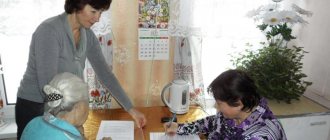According to the law, caring for an 80-year-old pensioner is counted in the insurance period, which allows the unemployed to receive payments and not worry about the lack of official work. But for such “employment” it is important to prepare the documents correctly, know your obligations and comply with the requirements of the legislation of the Russian Federation.
Below we will look at how to apply for experience caring for a person of retirement age, what documents to prepare, and how much you can get if you look after an 80-year-old pensioner. Let's talk about what needs to be done and what events are important to notify the Pension Fund in a timely manner.
What is caring for a pensioner over 80 years of age?
As old age approaches, it becomes more difficult for any elderly person to take care of himself in everyday life.
If the situation is aggravated by illness, the situation is even more difficult. In this case, outside support from other people is constantly required. Old people, as a rule, receive free help from their relatives. Not everyone is aware that for persons 80 years of age and older, the state provides the opportunity to receive assistance from other citizens, which is paid for by the Pension Fund. The compensation is paid monthly along with the pension. In the circumstance that the payment is due to the caregiver, the amount is received by the disabled person who needs help. Upon receipt of funds, the elderly person independently pays the citizen caring for him. Not everyone can pay for caring for an elderly person over 80 years of age. Russians who do not work and do not receive benefits as unemployed, but are able to work according to pension legislation, can count on compensation.
For care, family ties and living together do not play a role. Strangers have the right to look after the elderly and receive payment for it. The category of disabled persons entitled to financial assistance from the state includes:
- disabled people of group I;
- pensioners recognized by the medical commission as requiring constant care;
- citizens 80 years of age and older.
Features of the subsidy
As a rule, elderly people whose age has reached 80 years or more receive help from their closest relatives, and the latter are not always aware of the possibility of providing them with payments for the support offered to the pensioner.
Compensation for caring for elderly people over 80 has a number of features, in particular:
- Provided monthly and transferred to the pension provision of the person receiving support from third parties;
- Payment in favor of the caregiver is made by the pensioner himself, through a proportionate allocation of funds from the received pension;
- Only a certain group of citizens have the right to apply for payment for care;
- The presence/absence of family ties with a pensioner who requires care does not matter;
- Along with elderly citizens over 80 years of age, the following disabled persons have the right to apply for care services:
- Having a disability of the first group;
- Pensioners who have official medical documents confirming the need for constant third-party care;
- In the event of a change of residence of the parties to the relationship, it is necessary to notify the branch of the Pension Fund of the Russian Federation within whose competence the territorial area is located;
- When providing patronage services to several elderly persons, documents are submitted for each of them separately, while the territorial jurisdiction of the Pension Fund of the Russian Federation may differ depending on the place of registration of the persons under guardianship;
- If legal requirements are met, compensation payments will be assigned starting from the month in which the application was received.
Who can care for the elderly
The one who doesn't work. Elderly people over 80 years old are entitled to care by law. The state is ready to pay 1,200 rubles a month to help pensioners. The money is small, but for a year of such work a person is entitled to one year of experience and 1.8 pension points.
Those under 80 years old can also be cared for, but in order to formalize this, you need to get a conclusion from the hospital. Only an officially unemployed citizen who has no income can arrange care for a pensioner. This definition includes:
- unemployed citizens who are not registered with the employment center and do not receive benefits there;
- full-time students, even if they receive a scholarship. By law, a scholarship is not considered income;
- minors over 14 years of age. To arrange care for a pensioner, they need the written consent of one of the parents and permission from the guardianship and trusteeship authorities.
Cannot apply for care:
- other pensioners, since a pension is considered income;
- individual entrepreneurs, even if they do not conduct any activities and do not receive income.
Family ties are not necessary: a pensioner can be your grandfather, your neighbor on the landing, or no one at all.
Who is entitled to receive funds?
It is difficult to care for an elderly or disabled person, both physically and mentally, so most often close relatives or well-known people who can easily find a common language with the disabled person become guardians.
But nevertheless, compensation for caring for the elderly after 80 years of age can be paid to any citizen of the Russian Federation over 14 years of age who has received the consent of the person being cared for. This may be a person who is related to the elderly person or a stranger. The guardian must be able to work, but not have official employment and not receive unemployment benefits, pensions or social benefits.
Reference! Lack of income is a mandatory point, so if there is no other way out, you will have to quit your job, since the purpose of the pensioner care benefit is to partially replace the possible income of the guardian.
If he has a source of income, it turns out that the state pays twice the amount intended for the same purpose. Because training is not considered employment, and a scholarship is not considered a benefit, schoolchildren and students can receive compensation.
Requirements for a caregiver
Registration of care for a pensioner over 80 years of age is possible if specific conditions are met. The state requirements for a person caring for an elderly citizen are:
- citizenship of the Russian Federation;
- permanent residence in Russia;
- ability to work under pension legislation;
- lack of income from labor and entrepreneurial activities (no transfers of insurance contributions to the Pension Fund, no registered individual entrepreneur status);
- absence of registration as unemployed in the employment service with payment of unemployment benefits.
Any entrepreneurial activity of the guardian (for example, lawyer, security) is regarded as work if he has a valid individual entrepreneur status, even if the non-working entrepreneur temporarily has no income at the time of receiving payments. Students/pupils can receive compensation, since study is not included in the work (insurance) period, and student scholarships are not counted as income.
In addition to students, payments can be received by housewives and women who, while on maternity leave, receive benefits from social security authorities, since the employer does not maintain a job for them. The age limit for citizens caring for the elderly is legally limited. This opportunity is available to Russians who are already fourteen years old. For such a group of young people, it will be necessary to confirm the consent of the parents and the guardianship and trusteeship authority for the provision of such a service.
Required documents
Below you can familiarize yourself with the list of documents that are required to formalize guardianship for an 80-year-old.
- Application from the citizen who will provide care.
- Consent of a disabled person to be cared for by that person.
- A certificate from a medical institution and the health status of the elderly person.
- Copies of civil passports of the guardian and the ward.
- Work books.
- Insurance certificates (SNILS).
- A document that confirms the lack of registration with employment authorities.
- For schoolchildren: a certificate from the school and parental consent.
- For students: confirmation of full-time study.
Application procedure
The application form can be obtained from the pension fund branch or on the official website of this organization.
Data that will need to be provided in the application:
- Name of the territorial body of the Pension Fund of the Russian Federation.
- Information about a citizen caring for an elderly person:
- FULL NAME;
- SNILS number;
- citizenship, passport details;
- registration information and residential address;
- contract phone;
- information about whether he is currently working, whether he receives income (unemployment benefits, pension payments).
- Information about the person under guardianship, the start date of guardianship, the reason for which care is provided.
- Date, personal signature, signature transcript.
Drawing up a consent
- Name of the territorial body of the Pension Fund of the Russian Federation.
- Information about a disabled citizen:
- FULL NAME;
- SNILS number;
- address;
- phone number;
- passport details;
- information about whether it works or not.
- The reason why care will be provided.
- Full name of the future guardian.
- Date, signature, transcript of the signature of the elderly person.
List of responsibilities
The obligations of a trustee to his ward include:
- Purchasing groceries and other necessary goods (in this and other items on the list, costs come from the pensioner’s funds).
- Payment of utility and other bills.
- Dry and wet cleaning of the premises, other activities to restore order.
- Assistance in carrying out hygiene procedures (washing, etc.).
- Monitoring the physical condition (measuring the patient’s temperature, blood pressure, etc.).
- Checking the availability of necessary medications, replenishing the first aid kit.
- Calling a doctor, accompanying the ward when visiting a clinic, or receiving medical workers at the ward’s home.
There are situations in which a trustee may be relieved of their duties. It happens:
- At his personal request.
- In case of inadequate care for a pensioner.
- Upon application to the court by the guardianship and trusteeship authority (TCA).
- When the disability group of the ward is lowered (which implies a greater level of independence for the pensioner and the absence of a care allowance for this case).
- At the request of the ward himself (if he is a legally competent person over 14 years of age).
Types and forms of care for a pensioner
The law defines three categories of persons who are entitled to a paid assistant:
- Pensioners under 80 who need care. The need for guardianship for such citizens is determined by a special medical commission. The lower age limit is the time for old age retirement (for 2020 it is 55.5 years for women and 60.5 for men).
- Elderly persons reaching 80 years of age.
- Disabled people of group I. At the same time, a separate payment option is established for those who look after their own disabled child.
In order for the care of elderly parents or unrelated elderly people to be paid for by the state, it is necessary that the ward belong to one of the three specified categories. The following types of such services are distinguished:
- Full custody. Established over citizens of any age who, due to mental illness (and other reasons), are not legally competent.
- Guardianship. In a narrow legal sense, this is control over persons recognized by the court as having limited legal capacity. As a rule, these are people who abuse alcohol or drugs and create financial problems for their family. In a broad sense, guardianship refers to any form of care for the elderly and disabled, including payment for this service.
- Patronage. It is installed over persons who, due to age or physical limitations, cannot independently care for themselves. Guardianship (in the broad sense of the word) is synonymous with patronage.
Grounds for granting benefits
The onset of old age is inevitably associated with changes in health and a decrease in physical activity, which is why the state provides incentive payments to persons who have expressed a desire to care for elderly parents over 80 years of age or other relatives or third parties.
Among the factors that serve as grounds for providing third-party assistance to an elderly pensioner are the following circumstances:
- Lack of self-service options;
- Having a serious illness;
- Recognition as a disabled person.
Conditions for assigning compensation payments
The peculiarity of this form of payment is that it is accrued to the ward as an additional payment to the pension, so that he can independently pay his trustee. At the same time, if for persons under 80 years of age a special commission is required to determine the need for patronage, then for persons older than this age or with a Group I disability, a guardian is appointed without examination.
The payment amount is 1,200 rubles/month, regardless of the amount of work done and the age of the person being cared for. There are two exceptions:
- Registration of guardianship over an incapacitated or partially capable person. In this case, the trustee himself manages payments for caring for the elderly.
- A situation where benefits are paid to the mother, father or guardian caring for a group I disabled child . In this case, the monthly payment is accrued to the trustee himself and the consent of the ward is not required. The amount of the benefit will be greater than generally accepted - 5,500 rubles.
One of the conditions for granting care pay is that the caregiver must be unemployed. As compensation for the opportunity to accumulate insurance experience in another place, he is annually assigned 1.8 pension points to form an individual pension coefficient (IPC).
At the same time, it is important that the citizen has intervals of other work activities before and after the period of guardianship. Only in this case, the experience of caring for the elderly over 80 years of age (or other pensioners) will be taken into account when forming a pension. The duration of these intervals does not matter - the minimum length of service is 1 day.
According to the law, assistance to the elderly and people with disabilities implies certain benefits for the caring party. For example, this is a preference for free travel on city and intercity transport when accompanying a group I disabled person to the place of treatment and back.
Benefit amount and payment procedure
Only one person can care for an elderly citizen who has reached the age of 80, and the caregiver himself can patronize several pensioners at the same time. The amount of compensation payment in 2020 is 1,200 rubles.
For those living in areas with difficult climatic conditions, the specified amount is increased by the regional coefficient determined for the given territory. For example, for the Kuril Islands this figure is 2.0, while for the southern regions of the Sakhalin region it is only 1.4.
Please note that assistance towards old age care costs is provided to the pensioner being cared for.
This is due to the purpose of protecting the elderly from fraudsters and citizens who evade or dishonestly perform their duties. Since the amount of 1,200 rubles is an additional payment to the pension, the elderly person himself pays it to the caregiver.
- Why do heart attacks occur more often in winter?
- Kiwi jam - how to make it with banana, lemon or orange according to step-by-step recipes with photos
- Living wage for a pensioner in 2020
Compensation payments for caring for a disabled person.
Care for people over 80 years of age is paid in the amount of 1200 rubles. This amount is established by Presidential Decree No. 175 of February 26, 2013. The assistant receives the money directly from the elderly person himself. The amount of compensation is multiplied by the coefficient established in the area of residence of the disabled person. Such payments are provided to each person under guardianship. For example, if a person provides assistance to three pensioners, then his monthly compensation will be triple the amount of 1,200 rubles, that is, 3,600 rubles.
Yes, the amount is quite small and in most cases such payment for caring for a relative is paid to members of his family. This benefit is not indexed by law.
Multiplication by the regional coefficient is equivalent to the value used to increase pension payments in the territories:
- Regions equalized with the Far North and the Far North itself.
- With a difficult climate.
- And others where additional expenses are necessary to maintain life.
What duties must be performed to care for a pensioner?
Helping the elderly is not only a troublesome task, it is an even greater responsibility and hard work. Patronage of an elderly person over 80 years of age implies the organization of meals, household, household and hygienic services by a person who has voluntarily taken on such work. Different disabled people require different types of help depending on their health status. Some lonely people need more human attention, help with cleaning and buying groceries, others need support at a different level.
Often, pensioners draw up contracts with their assistants, which spell out the responsibilities and scope of assistance. Receipt of monetary compensation is accompanied by the performance of duties:
- pay bills (utility, tax, etc.) from the ward’s own funds;
- buy necessary products, clothes, shoes, hygiene items;
- help with everyday matters (cleaning the premises, personal hygiene procedures);
- buy prescribed medications and ensure they are taken on time;
- Cook;
- regularly measure biomarkers - indications that require monitoring (pressure, blood sugar, temperature, heart rate);
- send and receive correspondence.
Current legislation does not introduce a definition of the concept of “guardianship over an elderly person with the right to inherit his property.” This means that automatic inheritance of the ward’s housing by the person caring for him is not expected. If an elderly pensioner independently decides to leave his property (part of it) to an able-bodied assistant as an inheritance, then it is necessary to write a will.
Compensation payment for caring for disabled citizens
For caring for elderly people over 80 years of age, compensation of 1200 rubles is paid. The amount is established by the President by Decree No. 175 of February 26, 2013. The money is transferred to the assistant by an elderly person. The amount of compensation increases by the regional coefficient at the place of residence of the pensioner. Payments are provided for each ward person. So, if a citizen helps two pensioners, the monthly amount will be double the amount of 1200 rubles, that is, 2400 rubles.
The amount is not so large and mostly family members receive payments for caring for a relative over 80 years of age. Indexation for this type of benefit is not provided for by law.
The application of the regional coefficient corresponds to the indicator that is used to increase pensions for residents of the territories:
- the Far North and regions equated to it;
- with a difficult climate;
- others – where additional costs (financial, physical) are needed to ensure normal life.
Compensation payments: size, reasons for increase
Special Decree of the President of the Russian Federation No. 175 establishes the basic amount of compensation payments, which act as a reward for the patronage provided. Thus, the work of caring for a pensioner is valued at 1 thousand 200 rubles.
If patronage is carried out in relation to two or more people, then the amount increases two or three times - in proportion to the number of pensioners.
These payments are provided to the carer by the pensioner himself, since the latter receives a pension increased by the amount of the remuneration.
Since the subsidy is not significant and is not subject to indexation, third parties (without blood relationships) rarely express a desire to take responsibility for caring for elderly citizens.
When living in areas where the corresponding coefficient is calculated, the payment will be slightly more than the base one. These areas include:
- regions of the Far North (including territories equated to them);
- areas with severe climate;
- areas where there are no normal conditions for life support or additional costs are required to obtain/create them.
Benefits and nursing experience
You can take as many elderly people under your wing as you like; each will receive 1,200 rubles a month, but the length of service will be the same as for one. For example, if in 2020 a person cared for his grandparents for a whole year, then he will receive 28,800 R (14,400 R for each), length of service and 1.8 pension points.
According to the law, length of service will be accrued if you worked before leaving or went to work after that. It doesn't matter whether you worked for a month or ten years. The only people who will not be given seniority are those who have not worked at all in their entire lives.
Money for care will not be accrued to you personally, but to the pensioner for whom you are caring. His job is to pass the compensation on to you. The pensioner is allowed to pay you extra or keep part of the transferred money for himself - as agreed.
The law is silent on duty of care. For example, I had no responsibilities at all: we arranged for care only for the sake of my experience, my husband’s grandmother herself insisted on this.
But a situation may arise when a pensioner begins to demand more services than you agreed upon. Or he will fall ill with a serious illness, and he will need serious care that you are not ready to provide. It’s up to you to decide what to do here. You sign a contract to care for an elderly person voluntarily and can unilaterally terminate it at any time. You just need to write an application to the Pension Fund.
Guardianship of the elderly with subsequent right of inheritance of property
When signing an agreement to provide care for an elderly person, the ward can stipulate that after his death, the inherited property will belong to the guardian.
Note!
But after the death of at least one of the parties to the agreement - the ward or guardian - the document becomes invalid and is canceled even if certified by a notary.
Therefore, the only way to subsequently inherit the property of a person under guardianship is to draw up a will, according to which the inheritance will be transferred not to the heirs of the first category, but to the guardian, which is certified by a notary.
A ward can become an heir if:
- he is 18 years old;
- he has full legal capacity;
- he is a citizen of the Russian Federation.
Registration of care for a pensioner
In order to arrange guardianship over a recipient of pension payments, the following steps must be taken:
- Obtain consent from the ward or his official representative for supervision services.
- Prepare an application for the Pension Fund.
- Visit this institution together with the pensioner for whom guardianship is being established. If he cannot visit the Pension Fund due to health problems, then the documents for registration of care for the pensioner are supplemented with the notarized consent of the ward to the candidacy of a trustee. An alternative option is to visit the home (or hospital) of the Pension Fund client group.
- Wait for a response to your application. The legislation provides a 10-day period for this procedure. If the Pension Fund makes a positive decision, then, starting next month, the trustee can begin to perform his duties. If a candidacy is rejected, the applicant receives an official response stating the reasons - this decision can be challenged in a higher authority.
The prepared application for the Russian Pension Fund must include:
- The name of the territorial branch of the Pension Fund to which the pension recipient belongs.
- Last name, first name, patronymic of the candidate for the position of trustee, his date of birth, registration address and contact telephone number.
- Similar personal data of the pensioner.
- Request for guardianship.
- Mention of the lack of work and other sources of income (for students it is necessary to indicate the university and form of study).
- Estimated start date of patronage or guardianship.
- List of attached documentation.
- Date, signature of the applicant.
Guardianship of an elderly person
In this case, registration of care for a pensioner requires first recognizing the ward as incompetent. This requires:
- Begin the process of declaring a specific person incompetent. The initiator can be a family member of the pensioner, his official representative or an employee of the guardianship and trusteeship authorities.
- Conducting a forensic psychiatric examination (FPE). It is carried out in a specialized institution by a commission of 4-5 people. The person being examined arrives there voluntarily or may be brought there by force. The result of the SPE is a special act where a particular citizen is recognized as incompetent, or this diagnosis is rejected.
- If the result is positive, the initiator submits an application and accompanying documents to the court at the place of registration of the pensioner (or at the location of the clinic, if the patient is undergoing inpatient treatment). The reverse procedure is also possible - all papers are first submitted to the court, which appoints the POC.
- After submitting documents to the judicial authorities, a hearing time is set within a month (in this case, the total interval for consideration of the case should not exceed 3 months). Mandatory participants in the process are an employee of the prosecutor's office and a representative of the guardianship and trusteeship authorities. If it is objectively impossible for a mentally ill person to attend the process (for example, an exacerbation of the disease), an on-site meeting is held in a psychiatric clinic.
- After declaring a person incompetent, the guardianship and trusteeship authorities have a period of 1 month to appoint a trustee.
The package of documents submitted to the court includes:
- Statement.
- A copy of the report of the forensic psychiatric examination (if it was not carried out, then the application must contain a request for its appointment).
- Russian citizen passport.
- A certificate stating that a specific person is registered at a psychoneurological dispensary.
- Various documents confirming the incapacity of a given person (for example, a copy of a statement to the police from neighbors about inappropriate behavior).
- Certificate of family composition.
- Receipt for payment of state duty (300 rubles).
Unlike a trustee, a guardian has complete control over the income of the ward in the interests of the latter. Wherein:
- According to the law, he does not have the right to inherit his home (after all, an incapacitated ward cannot enter into transactions with other people, and the guardian himself does not have the right to make a decision leading to his own enrichment). In the event of the death of a mentally ill person, his apartment will legally pass to his heirs or the state.
- A citizen who takes care of an elderly person is required to account for expenses incurred and transactions with the ward’s property (for example, the purchase of furniture, household appliances, etc.). To do this, he annually submits a report to the PLO, attaching receipts for purchased goods.
Arrange for care for a disabled pensioner
In accordance with the law, in this case it is possible to arrange supervision with a monetary payment only for a disabled person of group I.
The following features exist:
- If the person being supervised is legally competent, then guardianship in the form of patronage may be issued for him. For this case, the compensation payment for caring for disabled citizens is 1,200 rubles, and it is transferred to the pensioner for subsequent settlement with the caregiver.
- If one of the parents is caring for a disabled child (or a group I disabled child since childhood), then he can formalize guardianship in the form of guardianship. The fee for the service is 5,500 rubles, and this amount is received directly by the guardian.
Patronage for an elderly person
In this case, to apply for supervision with the accrual of compensation payments, one of two conditions must be met:
- The need to provide care for elderly people at home, documented by the medical commission, is for a pensioner up to 80 years of age.
- The onset of 80 years of age.
This service will be considered patronage, since the trustee carries out current expenses in agreement with the ward, to whom funds are transferred (1,200 rubles/month) to pay for supervision. The registration process in this case does not differ from the standard algorithm indicated above.
How much pay
The additional payment for caring for an elderly person is 1,200 rubles. The money is paid every month to the pensioner’s account (in the same place where his pension is calculated). He then transfers the amount to the assistant.
For people who live in the Far North and equivalent regions (“northerners”), the amount of payments is higher, since due to difficult climatic conditions they incur additional material costs. The amount is calculated individually in each locality based on the regional coefficient.
If care is provided for several pensioners who have reached the age of 80, the amount is multiplied by their number.
For example, in your region they pay 1,200 rubles for caring for an elderly person. When caring for two elderly people, you will receive 1200×2 = 2400 rubles. There are no restrictions on the number of persons cared for.
You can spend money as you wish.
Terms of consideration and assignment of payment
When submitting documents for care, the specialist makes a note about their acceptance, after which a decision on the assignment of compensation must be made within 10 working days. If refused within 5 days, the applicant must receive a written explanation of the reason. The benefit for caring for an elderly person is assigned from the month of filing the application to the Pension Fund, but not earlier than the date the right to it arises, and is paid throughout the entire period of care.
How is experience calculated?
According to the Federal Law “On Insurance Pensions” No. 400 F3, the period of caring for a pensioner over 80 years of age is counted in the insurance period if the carer worked previously or went to work immediately after that. If a person has never worked and does not plan to, he is not entitled to seniority. In addition to length of service, pension points are awarded at the rate of 1.8 points per 12 months. If a person takes care of two or three pensioners aged 80 years and older, his insurance period will still be counted the same as for one.
Forms of formal care for the elderly
Modern legislation has defined several forms of care for citizens of our country who have lost their ability to work and need support and care. Among them:
- full guardianship carried out over people who have completely lost the ability to care for themselves independently (with the first group of disabilities, serious illnesses, incompetent citizens);
- patronage provided to people who are capable but have limited physical capabilities;
- care for elderly people who have lived to 80 years of age and older.
When performing the first two forms of care, payment of a separate benefit is not provided. The care of elderly people over the age of 80 can be paid for with a small benefit provided by the state.
How to arrange care for a pensioner
Come together to the pension fund. To register for care, you need to come with the pensioner to the Pension Fund office where the pensioner receives his pension and write an application. To the pensioner - about consent to care, to you - about the assignment of compensation.
This is the application you fill out:
This is the application a pensioner fills out:
If a pensioner cannot come, you can get a notary permission from him or call the PFR mobile client service.
List of documents
To assign an additional payment, you need to collect documents (originals) and prepare photocopies of them according to the list. Documents are submitted from a citizen who is going to care for an elderly person:
- Application for compensation.
- Passport/Birth Certificate.
- Work record book/Certificate from the educational institution indicating the expected time of graduation.
- Certificate from the employment service confirming the absence of unemployment benefits.
- SNILS.
- Confirmation of absence of entrepreneurial activity (certificate from the tax authority).
- Written parental consent/permission from guardianship authorities (for Russians 14-16 years old).
Documents from a person who requires the help of an outsider are also needed:
- Passport.
- Consent from the sponsored pensioner for a specific person, indicating the full name and passport information of both.
- Pensioner's ID.
- SNILS.
- Extract from the medical and social examination report on disability.
- Certificate from a medical institution regarding the need for constant supervision (for a pensioner under 80 years old).
Applications for payment processing
A sample application will be provided to you by the Pension Fund, or you can download it from the official website of the Pension Fund. The application for payment of compensation from the caring person must contain the following information:
- name of the local body of the Pension Fund;
- about the applicant - SNILS number, citizenship, passport data (series, number, date of issue, also date, place of birth), registration and actual residence, telephone number;
- indication of the applicant’s employment status – the person does not work, does not receive benefits/pensions;
- date of commencement of care for the citizen, indicating his full name and circumstances requiring constant supervision - age/disability/as indicated by the medical institution;
- a request for compensation with reference to the instructions of the Decree of the President of the Russian Federation of December 26, 2006 No. 1455;
- familiarization with the warning about the need to notify the Pension Fund of the occurrence of circumstances under which payments are terminated;
- a list of attached documents;
- date of completion, signature and its transcript.
Duration of consideration and appointment deadlines
The time allotted for the submitted documents to be reviewed is limited to 10 working days. If an application is rejected, the Pension Fund is obliged to notify the applicant about such a decision within no more than 5 days after adoption, and employees must explain the reason for this result, the possibility and procedure for appealing. To provide all the necessary certificates and documentation, 3 months are allocated. Compensation is calculated from the month of transfer of documents.
What documents need to be provided to register the CLC?
The right of guardianship can be obtained through the guardianship authorities (if the person under guardianship has not reached the age of 80) or through the Pension Fund. You can also make a payment remotely, through your Personal Account on the Pension Fund website.
To do this, you need to provide two applications - on behalf of the assistant and on behalf of the pensioner himself, a description of the assistant. Issued to him at the place of work or study, a certificate that is issued to the guardian in psychoneurological, drug addiction and tuberculosis dispensaries, a document that confirms that the guardian has living space.
The documents provided for concluding a guardianship agreement also include an agreement between the pensioner and the guardian. Here it is permissible to conclude an agency agreement, a property trust management agreement, as well as any civil law agreement that approves the list and boundaries of the rights and obligations of the guardian.
So, persons wishing to care for an elderly person are required to prepare the following package of documents:
- a passport certifying the fact that the person is an able-bodied citizen of the Russian Federation;
- work record book, which shows that the proposed guardian is not employed;
- own statement of intention to care for the ward;
- a certificate from the local Pension Fund stating that he is not entitled to a pension and payments are not being made;
- a certificate from the employment agency stating that he is not listed as unemployed.
The package must also contain documents from the ward:
- his passport as a citizen of the Russian Federation and work book;
- a statement of consent to receive care from the proposed guardian, duly executed;
- a document on a medical examination of the ward, confirming the fact of his need for outside care; If the person under guardianship is over 80 years old, then such a certificate is not required.
The decision to appoint a CLC (or refusal) is made at the local PFR office within 5-10 days, counting from the submission of documents (if the package is incomplete, then the date of acceptance of documents is postponed until the complete set is reached).
The money must be paid in the same month when a positive decision is made.
Where and how to submit
The necessary documentation for processing compensation can be personally delivered to the employee at the Pension Fund, or sent through the State Services Internet portal. If you submit information personally to a PF employee, then there is the option of making an appointment in advance via the Internet to save your time. The compensation will be determined by the local branch of the Pension Fund, which pays pension contributions to the elderly person.
If you are going to care for several elderly people, then you will need to contact each relevant department to which the person under care is assigned. If the person being cared for changes his or her place of residence, the person providing care will have to contact the department that belongs to the new address of residence of the pensioner. Most likely, you will need to re-submit the entire package of documents.
How to apply for compensation for guardianship of your grandmother?
To process these payments, you must submit an application for caring for an elderly person to the authority that calculates the pension for the disabled person. That is, if a citizen receives a cash payment from the Pension Fund and through the law enforcement agency, then he can contact any of these organizations.
You can submit an application:
- to the local branch of the Pension Fund of the Russian Federation;
- to the nearest MFC;
- through the government services portal in the form of an electronic application.
How to avoid problems
Be honest with your pension fund. The Pension Fund does not check how you care for a pensioner, but this does not mean that the state does not control you. You must notify the state of any changes, otherwise you will be forced to return the money due for care in court.
Notify the Pension Fund if:
- You got a job, applied for unemployment benefits or a pension. Within 5 days, visit the Pension Fund and write a statement about termination of care. You now have income and are no longer entitled to compensation. Payments will stop starting next month. During this month, the pensioner will receive them in full for you, even if you wrote the application at the beginning of the month.
- You received a one-time remuneration (fee, paid internship, etc.). Within 5 days from the moment the money is transferred to you, personally notify the pension fund about this. The contract with you will not be terminated, but compensation for the month when you received income will not be accrued.
- A sponsored pensioner died. Report this to the Pension Fund within five days. You will no longer receive compensation and length of service.
If you changed your first name, last name, patronymic or changed your passport, do not forget to notify the Pension Fund of the Russian Federation about this as well. You still need to look into the pension fund to get a new SNILS. At the same time, ask for new data to be added to the care agreement. These changes will not affect compensation or length of service.
I looked after my husband’s grandmother for six months, then got a job, reported this to the Pension Fund and closed this story without any problems. After me, my neighbor’s student Lena took care of my grandmother. According to a verbal agreement, grandmother and Lena divided the compensation in half - 600 rubles each. In the summer, Lena had a paid internship, which she did not report to the pension fund. Four months later, the Pension Fund learned about the income and asked Lena to return the illegally received compensation - 1,200 rubles. Lena still has the right to continue caring for her grandmother.
Who can provide care
There are no requirements in the regulations regarding the existence of a blood relationship between an elderly pensioner and the person selected to provide first aid. Therefore, any citizen who meets the following conditions has the right to exercise patronage:
- Availability of Russian citizenship;
- Permanent residence in Russia;
- Reaching the age threshold of 14 years;
- The caregiver is considered able to work in accordance with legislative regulations;
- There is no other official income;
- Unemployment benefits offered by the employment center are not awarded.
Conducting a business or other private practice that formally provides profit becomes a barrier to acting as a caregiver.
Since scholarships and maternity payments are not taken into account as labor income, the right to provide patronage services arises from:
- Housewives;
- Mom is on maternity leave;
- Students.
Will caring for an elderly person be counted as length of service?
The time frame during which care for an elderly person of 80 years or more is organized will be taken into account as the total length of service required to apply for a pension. It must be taken into account that the entire length of service in caring for an elderly person will be counted if there are records of a working period of any length before or after providing assistance to the pensioner. The pension coefficient will be calculated at the rate of 1.8 points for one year of care; its value is not affected by the number of wards. These conditions are legally established:
- No.-400-FZ, Art. 12 — “About insurance pensions.”
- No.-173-FZ, Art. 11 and 30 - “On labor pensions in the Russian Federation.”
It must be remembered that such insurance experience only implies the right to secure a pension; the time of guardianship does not affect the calculation of its value. Law No. 18-F3, which prescribes the allocation of pension payments from federal funds, provides for compensation to the future pensioner for the accrual of insurance payments for this period. The amount of compensation for non-insurance periods that are included in the pension period is determined individually in each case.
Termination of benefits for elderly care
Compensation payments are terminated for specific reasons, which are not limited to the death of one of the persons. If circumstances arise (which are specified below), the caregiver is obliged to notify the Pension Fund. Quite often people forget about this. Such negligence leads to unjustified crediting of amounts, which can lead to debt to the state. Five working days are allocated for notification. This can be done in any convenient way – remotely or in person.
Sources
- https://sovets.net/17580-uhod-za-pensionerom-starshe-80-let.html
- https://journal.tinkoff.ru/stazh/
- https://sovets24.ru/2355-kto-mozhet-oformit-na-sebya-uhod-za-pensionerom.html
- https://edem-msk.ru/uhod-za-pensionerom-starshe-80-let/
- https://pansionat-tulskij-dedushka.ru/kak-oformit-uhod-za-pozhilym-chelovekom-starshe-80-let/
Grounds for termination of payments
If circumstances arise that may serve as grounds for termination of payments, the patronage parties must immediately notify the competent employees of the extra-budgetary fund.
Reasons for termination of compensation include:
- The payee has:
- Employment;
- Registration with the Employment Center and assignment of unemployed status;
- Call for service in the RF Armed Forces;
- The time for retirement is approaching;
- Death;
- Refusal of duties for one's own reasons;
- Unfair provision of services;
- For the ward (pensioner):
- The onset of death;
- Deregistration from the Pension Fund of Russia;
- Restoration of the previous situation and no need to receive outside assistance (including loss of the status of a disabled person of the first group);
- Traveling outside the country/region and not notifying the Pension Fund about a change of residence;
- Transfer to permanent residence in a special social service institution.







